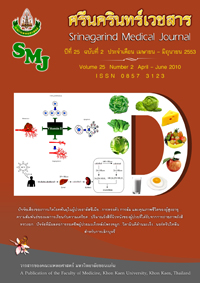The Study of Short –Term Precision of Calcaneal Quantitative Ultrasound (Achilles Express)
Abstract
Background and objective: Dual-energy X-ray absorptiometry is regarded as reference method for bone density assessment. Quantitative ultrasound (QUS) has been introduced as an alternative technology to bone densitometry. To study short-term precision (coefficient of variation; CV%) and the intra- and inter-observer reliability of QUS in measuring bone mineral density of the calcaneus.
Methods: This study is cross-sectional descriptive study. Subjects were 20 persons (10woman ,10 man )in the age group between 20-70 years olds.
Results Short-term precision of SOS ,BUA ,SI showed by coefficient of variation (CV%) were 0.99 ,6.42 ,6.27 respectively. The correlation coefficient (r) for SOS, BUA, SI between the 1st and 2nd observer was 0.821, 0.755 and 0.861 respectively (p<0.001). The limits of agreement for evaluating inter-observer reliability were used. The respective mean of differences and the standard deviation (SD) of SOS , BUA ,SI between the measurements of the 1st and 2nd observers were-2.99 (SD = 22.41), 0.19 (SD=10.71) and -1.1 (SD = 9.44). None of the comparisons significantly differed from zero, with p-value of one sample t-test compare with zero (i.e., 0.06, 0.797 and 0.101 respectively).
Conclusion: The QUS is the reliable tool for measuring bone mineral density and it could be used as alternative for diagnosing osteoporosis, particularly in areas with limited access to, and resources for, DXA.
Keywords: QUS (Quantitative ultrasound), DXA (Dual Energy X-ray Absorptiometry), reliability, SI (stiffness index)
�eip� �=� ment (grade) and duration of sleep, depression and level of stress showed correlation with duration of sleep and levels of stress (p < 0.05) but not correlated to depression. Sleep 6 hours and more had odds ratio of academic achievement 1.8 times to sleep less than 6 hours (p < 0.05) but depression and levels of stress were not significantly different.Conclusion: Poor academic achievement of medical students, correlated to sleep deprivation of less than 6 hours per day and correlated to increase levels of stress.
Key words: academic achievement, stress, depression, sleep deprivation, medical students




